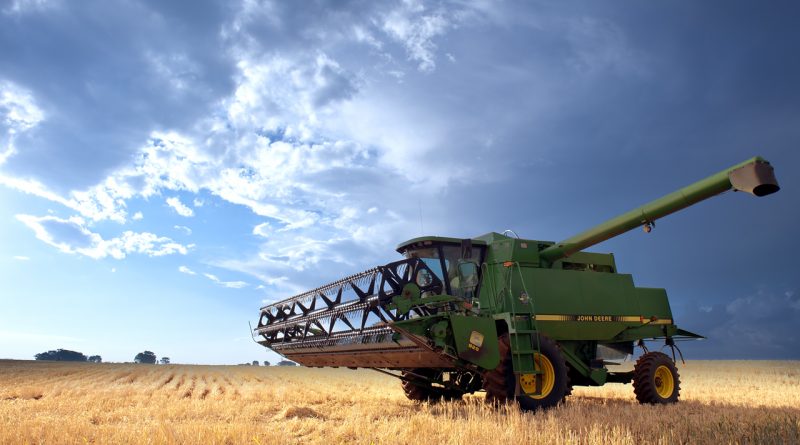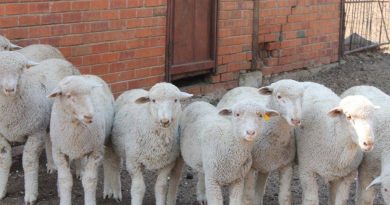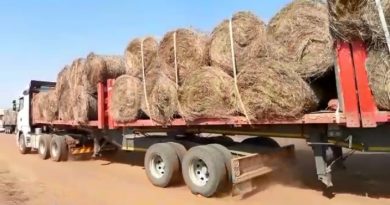How to maintain high-value equipment this harvest season
Farmers in the Western and Northern Cape, Free State, Limpopo, and other regions set to harvest their winter crops as summer approaches. As the last few years have shown, this means they also face the threat of extreme weather events, like the wildfires that have plagued countries north of the equator during their summer season.
Climate disasters bring with them a host of risks, one of which Soul Abraham, head of retail at Old Mutual Insure, believes is often overlooked: the poor maintenance of agricultural equipment. “The value of your agricultural equipment goes beyond its physical presence” he says. “It’s an investment that drives your business forward. Neglecting its maintenance can lead to significant setbacks, affecting not only your harvest but also the economic stability of the sector.” Abraham adds that the country’s food basket cannot afford setbacks, given the important role it plays in ensuring South Africa’s food security.
He says that lack of maintenance can cause fires in combine harvesters, a reoccurring challenge that has the potential to disrupt not only individual farming operations but also the broader agricultural landscape.
Abraham explains that the ignition of a fire demands three essential components: heat, oxygen, and fuel. Within the engine of a self-propelled harvester, these elements converge, making it a hotspot for fires. Most harvester fires start in the engine and rapidly extend to other parts of the machine. Coupled with the characteristic windy and low humidity conditions of South Africa’s winter climate, dry chaff becomes an ideal kindling, creating a potential tinderbox.
Harvesters inherently process substantial quantities of dry material, leading to the accumulation of dust and chaff particles. The elevated temperatures produced by turbochargers and exhaust manifolds further escalate the fire risk. Beyond damaging the machinery, itself, these fires can spread quickly, impacting neighbouring farms and property.
“It has been proven over the years that most combine harvester fires could have been prevented by spending only a few minutes each day cleaning the critical areas in the machine. The benefit of making sure it is done before harvest outweighs the risk of not doing it, considering the devastating consequences a fire can have on your business,” says Abraham.
The Peritum Agri Institute, which offers training on how to maintain and operate farm equipment, recommends daily maintenance in-season. Post-season maintenance includes the safe cleaning and storing of equipment and repairing machinery. Pre-season maintenance must also not be overlooked and may consist of evaluating repairs of cooling and electrical systems and specific components, and updating or upgrading of systems.
“Maintenance of equipment, such as tractors, combines and sprayers, is incredibly important. Ensuring operators are sufficiently trained is also crucial in extending the life cycle of high value equipment,” explains Peritum Agri Institute Operations and Maintenance lecturer Dr Willie Kotze.
He reminds primary producers that it is the responsibility of the operator to apply the settings, maintain the equipment, report operating errors, and oversee the repairs.
“On the other hand, it is the responsibility of the owner to ensure that operators adequately trained in using the specific equipment and that they are provided with safe and maintained equipment that is in working condition, with all the necessary safety measures in place,” says Dr Kotze, adding that this may include ensuring that the operator has access to the equipment manuals.
Both Abraham and Kotze emphasise the need for farmers to prioritise preventative measures to ensure a smooth and productive harvest. “Protect yourself, your business, and your investment in equipment and machinery by acting proactively and by focusing on a few basic aspects,” says Abraham.
His top tips on how to prevent losses during harvest season include:
• Cleaning the engine area thoroughly and regularly to remove any chaff and dust in and around the engine.
• Looking for chaff build-up beneath covers and guards in the engine.
• Using a compressor to clean these areas daily to prevent fires.
• Keep fire extinguishers handy and make sure they are serviced.
• Repairing or replacing damaged/worn electric cables and connectors that may cause sparks and short circuits. Rodent damage to electrical wires that then cause short circuits and bearing failures are usually noticed too late and this can cause harvester fires. Inspect vehicles before operating them.
Dr Kotze also recommends that farmers take precautionary measures to prevent damage to high-value implements in the event of natural disasters:
• Lightning: Do not park the high application machinery near tall trees, park the equipment in a store or shed when out of season
• Fires and machinery: Ensure that the combine harvester is clear of stubble and flammable material while working. To prevent veld fires, park equipment on cleared land and not in the field during harvesting times.
• Hail: To avoid hail damage, park the equipment in the shed or store.
Safe Driving with Tractors and Preventing Tractor Accidents https://t.co/rhJoDxhujj #ArriveAlive #Tractors pic.twitter.com/WObGoCbvKE
– Arrive Alive (@_ArriveAlive) September 4, 2022




